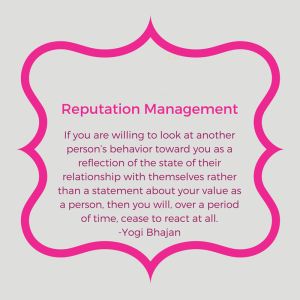Review sites, bad reviews and good customer service.
By: Jessica Dally
In our last article, we discussed the Facebook algorithm.
 But of course, if you’re on Facebook, or almost anywhere on the web, one thing you risk is the dreaded online review and online review sites. If reviews are great, business owners love these sites. But for most, it’s a mixed bag. And for many, it seems unfair that people can say whatever they want.
But of course, if you’re on Facebook, or almost anywhere on the web, one thing you risk is the dreaded online review and online review sites. If reviews are great, business owners love these sites. But for most, it’s a mixed bag. And for many, it seems unfair that people can say whatever they want.
For many a business owner, there’s little that causes more terror than an online review site. Sure, the in-person interaction with an upset or unreasonable customer is frustrating, but a review site? That’s something that seems completely unfair, uncontrollable and, to many business owners, just plain false.
And yet, most of us know that review sites can make or break your business.
So what do you do?
There are a few tactics business owners use when it comes to review sites. Sadly, some of these aren’t great ideas.
Ignore.
A bit like that rash on your arm, ignoring reviews on a review site doesn’t mean they will go away. Indeed, just like a rash or irritation, ignoring a problem may well make things a whole lot worse. It rarely takes care of itself.
Reviews don’t go away on their own. Ignoring a bad review means it stays there, festering and showing it’s ugly self to anyone who happens to come by it. Is it true? Is it false? Anyone who happens to read it has no real clue. They get to see that ugly wound and wonder. Many will assume that what the person said is true. Leave these reviews unaddressed, and you’ve essentially told customers you approve of what the reviewer wrote. In that way, ignoring a bad review is a lot more like approving it than saying you think it’s wrong. It’s not what you want to do.
Respond with an attack.
 Tit for Tat – the tactic of the schoolyard. Another unfortunate response choice. Unlike the ignore tactic, this time the reviewer has shown that you’re not great at customer service. They’ve managed to bring you down to their level and more importantly, they’ve done a good job of getting you to make yourself look bad. If their review didn’t do enough damage, the response sealed the deal. You’ve actually made their point for them!
Tit for Tat – the tactic of the schoolyard. Another unfortunate response choice. Unlike the ignore tactic, this time the reviewer has shown that you’re not great at customer service. They’ve managed to bring you down to their level and more importantly, they’ve done a good job of getting you to make yourself look bad. If their review didn’t do enough damage, the response sealed the deal. You’ve actually made their point for them!
Sure, it’s hard not to want to lash out at someone who has said something negative about your business. But behaving in a way that is immature just goes to show anyone who reads your response that you’re not someone they can trust with their business. Review sites aren’t simply about reviews. You’re marketing your business here. Put your best foot forward.
With the above two options out of the question, you’re left with one answer, respond respectfully.
But how do you do that when someone has insulted you? The same way you would in any other emotionally charged situation.
Give yourself a bit of time – never reply right away. When you first read a negative review, you’ll likely be emotionally charged. That’s OK . . . but we all know that doesn’t make it the right time to write logical and reasonable responses. So don’t even try. Give yourself a bit to calm down. The world won’t end if you take a day or two to respond.
Is there someone at your company or organization who is better at this than you? Have them do it. It may well be that this is too close to home for you. Outsourcing a response or, at least, running it past someone who isn’t quite so involved is NEVER A BAD IDEA. Do that. If you can’t have someone else write responses for you right now, then run your final response past someone before you post it. Find someone who will tell you the truth about your writing, even if it’s harsh and not what you might want to hear. I’ve done this type of work for many business owners as they are simply too close to the company to be able to separate themselves from a bad review. If you don’t have this person, can you pretend the review is about a different business? Find a way not to take the review personally.
Gather the facts. Don’t assume you know what happened. Get ALL the information you can. Is it possible that this person called and talked to someone else? Is it possible they sent an email that got caught in your spam folder? Look to see if there’s part of the story you’re missing. Only when you have the full story can you respond clearly, concisely and present yourself accurately. Remember, a cool, clear presentation of the facts can help you show what actually happened. Presenting something that isn’t the full story will not win you any favors, so learn the complete details of what happened. Take people’s description with a grain of salt. You’re doing that with the customer. Make sure you know what you’re hearing from employees isn’t biased either.
Reply with facts NOT emotions. There are generally three types of negative reviews. How you respond to them needs to fit what actually happened. See number 3! You need to know all the facts so you can choose the right option from below.
The customer was unreasonable and wants something unreasonable. Say so nicely. “It’s true; we do not allow pet monkeys in our apartment complex.” Sure, monkey owners looking to rent an apartment won’t like this response, but you don’t want to rent to them anyway. And those customers who are looking for monkey-free apartments are going to be REALLY ecstatic to see this response from you. They will see this customer’s complaint as unreasonable. This review actually works to keep away customers you don’t want and bring in the customers you DO want. It’s a win for everyone. “No, we don’t sell our honey for the same price as the supermarket, and here’s why:___”. Again, you’re looking for customers who want your product and those who understand the value of the product you sell. Your response serves to educate and to keep away those who are looking for something you don’t sell and don’t want to sell. Your goal as a business owner isn’t to sell to everyone. It’s to sell to the right people.
False story. The customer is telling a story that isn’t true. Be EXTRA careful here. Tell your story as best you can and MOST importantly, stick to the facts. Stay away from inflammatory words. The more your words reflect staying calm, the better you will appear. The more you seem like you’re attacking, the more credibility you give to the inflammatory reviewer. Win the battle by being calmer than the reviewer. Always strive to be and sound more reasonable. Being calm and reasonable is your goal. “I tried to return the frames I bought at the Honey Supply Store and the store would not take them back.” “Unfortunately Mr. Smith brought frames to us that we do not sell. While we aren’t sure where Mr. Smith purchased these frames, they are not something we have ever sold, and we were unable to return them for that reason.” Remember, you’re only giving the facts about the circumstances.
You ARE at fault. OK, this one is very hard, because it’s difficult for people to admit to a mistake. But there’s something you should know about this, if you do it well it too is a marketing win. Why? Because we’re all human and only the most unreasonable customers will expect that you never make mistakes. How you handle yourself here is probably the best thing you can do for your business. MAKE THINGS RIGHT and do it publicly. By showing your future customers that you’ll do what it takes, within reason, to make it correct, you show them that while you might not always be perfect, you will fix any problem should something not go to plan. Granted, if you have a ton of these reviews, you have a problem you need to solve, one or two over a series of MANY reviews will show a shop that people know they can trust. This type of negative review is one of your most important reviews, IF you handle it correctly!
“We found *** in our jar of honey” “We are SO sorry that this happened and are so glad that everyone was OK. Thank you for bringing this to our attention. Because of your notification, we have gone through all jars of honey and found them to be free of ***. We appreciate you bringing this to our attention so that we could ensure that no one else had this experience. We would love to give you several jars of honey to make up for this experience. Please contact us via our website so we can get these to you.”
Check yourself. If you’re writing your own responses, have someone check them. Have several people read each one. Have people outside of your business check them if need be. As you get better at this you’ll need to have fewer people check your work, but in the beginning have people review your responses for you.
Post it and watch it. On some review sites, people can update their review once they see your response. You may need to update your reply. Updating isn’t fun, but it can be necessary.
 The true key to responding to reviews is remembering one key fact. You’re not responding to the person who wrote the review. You’re responding so that people who read the review, looking for your business, know more about your business. What you say, how you say it, and what you do is all about marketing your business. Sure, you might actually solve someone’s issue via responding to a review. Most of the time, you’re actually hoping to influence future customers and show them what kind of business you truly are. So make sure your responses show the same kind of business savvy you’d show in any marketing brochure or advertisement.
The true key to responding to reviews is remembering one key fact. You’re not responding to the person who wrote the review. You’re responding so that people who read the review, looking for your business, know more about your business. What you say, how you say it, and what you do is all about marketing your business. Sure, you might actually solve someone’s issue via responding to a review. Most of the time, you’re actually hoping to influence future customers and show them what kind of business you truly are. So make sure your responses show the same kind of business savvy you’d show in any marketing brochure or advertisement.
So now you know how to handle bad reviews. Can you go back and deal with bad reviews from a while ago? You bet! No need to go back many years, but going back even one or two years is fine.
And how do you go about getting good reviews? Most sites tell you not to ask for reviews, and while that is true, there is no reason you can’t tell people you’re on different review sites. If you have a happy customer, make sure they know where they can review your company!
Possibly the best thing you can do is give customers a way to get feedback to you outside of these review sites. For many, they will reach out to a review site because they have tried ways to contact you or can’t find other means.
Today, excellent customer service is your best form of marketing. Word of mouth, usually through social media, will be your biggest marketing tool.
So don’t ignore these sites. Each one allows you to reply and respond. Do it!
Jessica Dally is an online marketing consultant based in Washington.






